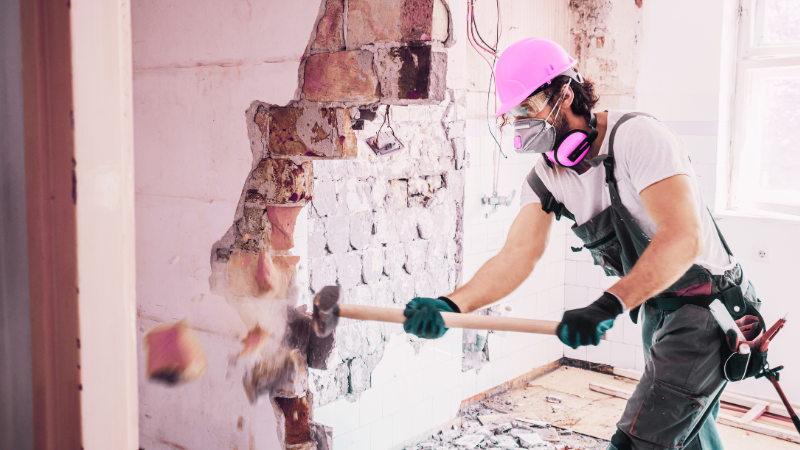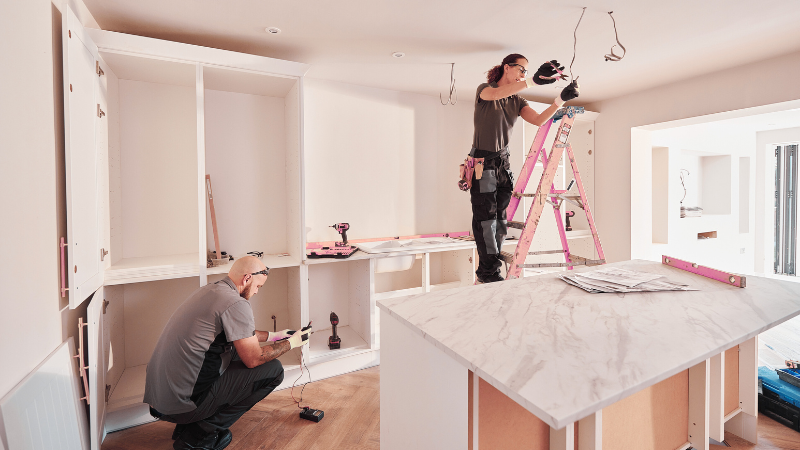Renovation Mortgages in the UK


A large number of homeowners in the UK would prefer to renovate a home rather than move from it.
- What is a Renovation Mortgage and How Does it Work in the UK?
- Costs That Renovation Mortgages Cover
- Are Regular Mortgages Available for Fixer-Uppers?
- How Much Deposit is Required for UK Renovation Mortgages?
- Can People with Debt Still Get Renovation Mortgages in the UK?
- Getting Renovation Mortgages for Properties You Already Own
- Consult with a Mortgage Broker
One in 10 respondents said the cost of buying and selling was off-putting, even though they may wish to sell their property.
This alone shows us that the desire for renovation is there – and a mortgage can make it possible.
For those with creative flair or those who can see the potential of a property that’s up for sale, renovation mortgages are often the aim.
New builds with perfect finishes and modern charm aren’t everyone’s cup of tea, and if you’re more the type who likes to personalise a home to reflect your own style while capitalising on designs of the past, buying a property to renovate may seem exciting.
Other scenarios where renovation mortgages make sense are:
- When you’re already in a home but want to make alterations (remortgage)
- You’re an investor who wants to flip a property
But…how do you go about getting a mortgage that covers the cost of the property purchase and renovations?
What is a Renovation Mortgage and How Does it Work in the UK?
In short, a renovation mortgage provides funding to purchase a property that needs to be renovated.
The property can be bought on the open market or at an auction.
These mortgages are usually very useful when purchasing property that lenders won’t finance.
Think of a derelict house that needs extensive repairs or properties without electricity or running water.
Most lenders and High Street banks view such properties as “unmortgageable.”
Enter the spotlight, renovation mortgages.
Renovation mortgages are granted based on the loan size and the property’s anticipated value after renovations are completed.
This can result in a higher mortgage than a mortgage based on a property’s current value.
Unfortunately, mortgage lenders aren’t always overly keen to provide renovation mortgages in the UK, and this comes down to the risk.
For instance, a buyer may start renovations and run into delays or find that certain processes and renovations are more expensive than initially calculated.
This could mean delays, which results in a slower return, or it could mean that the renovations can’t be completed at all. In such instances, the mortgage provider stands to lose.
Costs That Renovation Mortgages Cover
UK renovation mortgages are intended to cover the following:
- The cost of the property
- Repairs
- Remodelling and renovations
What Credit Score is Required for Renovation Mortgages in the UK?
It goes without saying that the better your credit score is, the more chance you have of getting approved for a renovation mortgage.
A good credit score tells the lender that you’re responsible with your bills, pay your debts, and are less of a risk.
hat said, it doesn’t mean all lenders will reject you outright. Sometimes, specialist lenders provide funding to borrowers with poor credit scores.
There’s a catch, though. Mortgages for bad credit borrowers usually come with higher fees and are typically provided in smaller, easy-to-manage amounts.
If you want to improve your credit score, you can:
- Regularly access your credit report to ensure that the information is correct.
- Make payments on time.
- Contest notes of missed payments etc, that are incorrect.
Mortgageable offers a free Equifax Credit Report as part of its service, with no obligation to proceed. Something worth considering.
RENOVATION MORTGAGES TYPICALLY REQUIRE DEPOSITS BETWEEN 15% AND 20% OF THE TOTAL AMOUNT NEEDED.
Are Regular Mortgages Available for Fixer-Uppers?
No law or rule stipulates that you cannot use a regular mortgage to purchase, repair, and renovate a property.
In fact, if the property is habitable, then this can be an option. If you’re on a budget or are a first-time buyer, this may seem the best route.
In such instances, the buyer will intend to carry out the repairs and renovations themselves instead of hiring professionals to handle them.
This option is often opted for because affordability shows that only a limited amount can be borrowed.
Some buyers and investors may even opt for a regular mortgage now and then, later on, take out an additional loan to cover repairs and renovations.
How Much Deposit is Required for UK Renovation Mortgages?
All mortgages in the UK require the buyer to provide a deposit. Some buyers save up for years to get to around 15% of the amount they need to purchase a home.
Renovation mortgages typically require deposits between 15% and 20% of the total amount needed.
The deposit can come from your personal savings, the sale of an asset (property, car, etc), or a gift from a family member.
Mortgage providers consider an individual’s financial circumstances when deciding whether to approve or deny a mortgage request.
Your unique circumstances may even make you eligible for a lower deposit.
The best thing to do is to check your eligibility before you make a formal application.
When a mortgage application is declined, it could show up on your credit profile, causing other lenders to wonder what got you declined.

Can People with Debt Still Get Renovation Mortgages in the UK?
Bad credit may get you instant denial from some lenders, but several others in the UK offer mortgages and other loans to people with debt.
The lender will likely assess your finances to determine your debt-to-income ratio. This is the amount of debt you have compared to your income.
The process aims to determine if your current debt is affordable and if adding any additional debt to the situation will strain your budget and cash flow.
A mortgage advisor or broker can help you with calculating your debt to income ratio so that you know what a mortgage provider will be looking at.
Getting Renovation Mortgages for Properties You Already Own
If you own a home and want to carry out renovations, remortgaging the property is recommended.
Remortgaging for renovations may carry limitations on the funding amount, and how much you qualify for may depend on:
- How much the property’s value will increase once renovations are complete.
- How much is left to pay on the mortgage
- Your current income and credit score
Remortgaging for renovations may have terms ranging from 5 to 40 years, with more interest expected the longer the term.
Also, you must go through an affordability assessment, as each mortgage, even remortgaging, requires a new credit check.
If your financial situation has worsened, you may not get a good interest rate or could be denied the loan.
Consult with a Mortgage Broker
By consulting with a mortgage broker about the ins and outs of renovation mortgages, you can get a better idea if you’ll qualify and which lenders in the UK are the best approach.
Call us today on 03330 90 60 30 or contact us to speak to one of our friendly advisors.
















